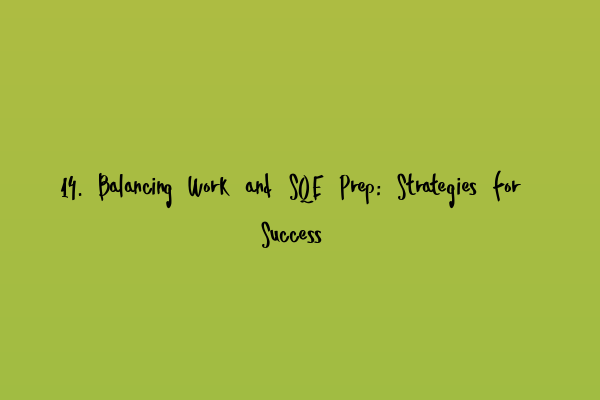14. Balancing Work and SQE Prep: Strategies for Success
Preparing for the SQE exam can be a demanding and time-consuming process. As a future solicitor, it is essential to strike a balance between your work commitments and your exam preparation. In this article, we will explore effective strategies to help you manage your time efficiently and maximize your chances of success, while still exceling in your professional career.
1. Plan Ahead
Planning is key when it comes to balancing work and SQE prep. Take the time to create a study schedule that fits around your work commitments. This will help you allocate dedicated study time and ensure you stay on track with your preparation.
Consider using digital tools such as study planning apps or online calendars to keep yourself organized. These tools can send you reminders and help you manage your time effectively. Remember to include breaks in your schedule to avoid burnout.
2. Prioritize and Focus
Identify the most important topics for the SQE and prioritize your studying accordingly. Focus on areas where you feel less confident and allocate more time and effort to improve your understanding in those areas.
At the same time, don’t neglect your work responsibilities. As a solicitor, your professional commitments are crucial. Find a balance by setting aside specific time slots for work-related tasks and ensure you honor those commitments.
3. Utilize SQE Webinars
One valuable resource that can help you balance work and SQE preparation is attending SQE webinars. These webinars provide expert insights and guidance, allowing you to gain a deep understanding of specific topics, at a time that suits your schedule.
Check out 24. Unlocking Knowledge with SQE Webinars: Expert Insights at Your Fingertips to learn more about the benefits of SQE webinars and how they can enhance your preparation.
4. Understand the SRA Syllabus
Having a clear understanding of the SRA syllabus is crucial for effective preparation. Familiarize yourself with the content and structure of the exam, focusing on the core areas of knowledge required by the SRA.
For a detailed overview of the SRA syllabus, check out 4. Unveiling the SRA Syllabus for the SQE to get a head start in aligning your study plan with the required knowledge.
5. Seek Support
Don’t underestimate the power of support from those around you. Communicate with your colleagues, friends, and family about your commitments and the challenges you may face during your SQE preparation.
Consider joining online forums or study groups where you can connect with fellow aspiring solicitors, share experiences, and seek advice. Sometimes, having a support network can make all the difference in staying motivated and on track.
6. Study Smart, Not Hard
Efficient studying is crucial when balancing work and SQE prep. Find study techniques that work best for you, such as summarizing key points, creating flashcards, or using mnemonic devices.
For additional tips and study tricks to maximize your preparation, check out 31. Conquer the SQE: Insider Tips and Study Tricks for Success.
7. Stay Organized
Maintaining an organized study environment is essential for effective preparation. Keep your study materials neatly arranged, create a comfortable and distraction-free workspace, and avoid clutter.
Additionally, consider using digital tools to organize your notes and resources, making them easily accessible whenever you need them.
8. Manage Your Time Efficiently
Time management is crucial when juggling work and SQE preparation. Prioritize your tasks, set deadlines, and avoid procrastination.
For strategies specifically tailored to managing your time effectively for SQE preparation, refer to Time Management for SQE: Strategies for Efficient Study Planning.
Conclusion
Preparing for the SQE exam while balancing work commitments requires careful planning, prioritization, and the ability to utilize available resources effectively. By following the strategies outlined in this article, and with dedication and perseverance, you can achieve success both in your professional career and in your SQE exam.
